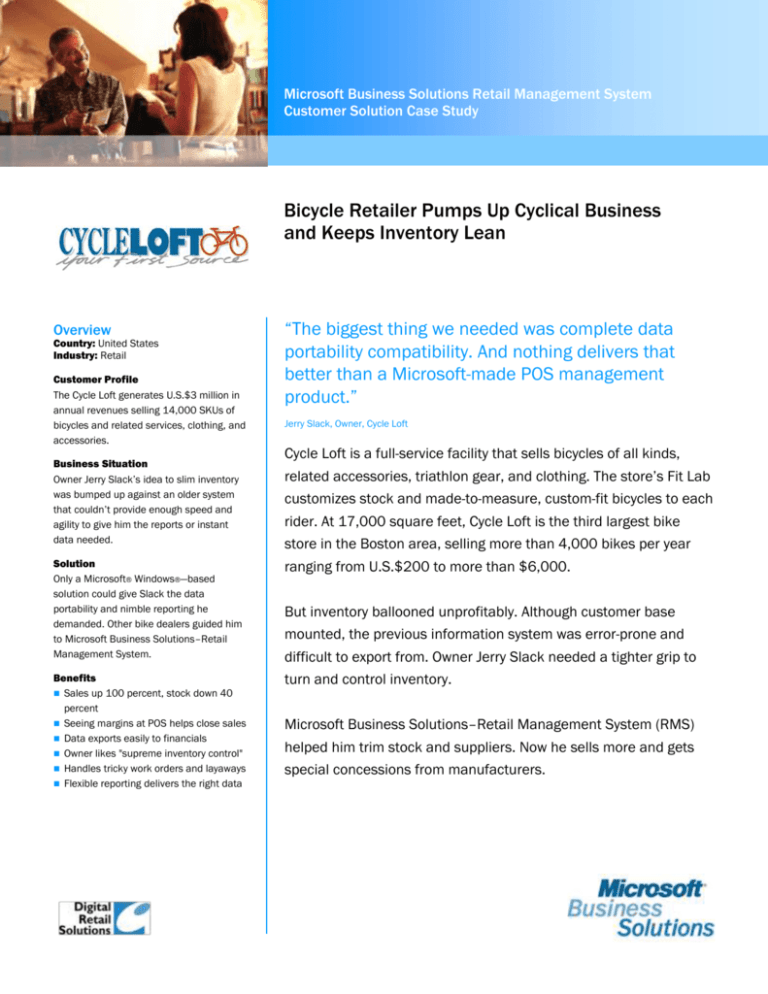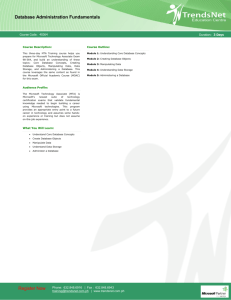
Microsoft Business Solutions Retail Management System
Customer Solution Case Study
Bicycle Retailer Pumps Up Cyclical Business
and Keeps Inventory Lean
Overview
Country: United States
Industry: Retail
Customer Profile
The Cycle Loft generates U.S.$3 million in
annual revenues selling 14,000 SKUs of
bicycles and related services, clothing, and
accessories.
Business Situation
Owner Jerry Slack’s idea to slim inventory
was bumped up against an older system
that couldn’t provide enough speed and
agility to give him the reports or instant
data needed.
Solution
Only a Microsoft® Windows®—based
solution could give Slack the data
portability and nimble reporting he
demanded. Other bike dealers guided him
to Microsoft Business Solutions–Retail
Management System.
Benefits
Sales up 100 percent, stock down 40
percent
Seeing margins at POS helps close sales
Data exports easily to financials
Owner likes "supreme inventory control"
Handles tricky work orders and layaways
Flexible reporting delivers the right data
“The biggest thing we needed was complete data
portability compatibility. And nothing delivers that
better than a Microsoft-made POS management
product.”
Jerry Slack, Owner, Cycle Loft
Cycle Loft is a full-service facility that sells bicycles of all kinds,
related accessories, triathlon gear, and clothing. The store’s Fit Lab
customizes stock and made-to-measure, custom-fit bicycles to each
rider. At 17,000 square feet, Cycle Loft is the third largest bike
store in the Boston area, selling more than 4,000 bikes per year
ranging from U.S.$200 to more than $6,000.
But inventory ballooned unprofitably. Although customer base
mounted, the previous information system was error-prone and
difficult to export from. Owner Jerry Slack needed a tighter grip to
turn and control inventory.
Microsoft Business Solutions–Retail Management System (RMS)
helped him trim stock and suppliers. Now he sells more and gets
special concessions from manufacturers.
“Computerize as fast as
possible. Do not view
that money as an
expense; see it as an
investment. I’ve had
seven computer
systems…. Each one has
paid for itself in its first
year.”
Jerry Slack, Owner, Cycle Loft
Situation
Cycle Loft’s single store with 28 employees
on five lanes sells U.S.$3 million annually in a
complete range of bicycles and accessories.
The two-story, 17,000-square-foot building is
the third largest bike store in the Boston
area. Bikes start at $200 and reach $6,000.
High-end bikes, often purchased by the part
with each frame dimension hand-fit to the
owner, are only 5 percent of unit sales but 15
to 20 percent of revenues.
Yet this was not an easy hill to climb until, 10
years ago, it dawned on owner Jerry Slack
that he was holding too much inventory,
selling too little, and buying from too many
vendors. Slack set out on a campaign of
Expansion Requires Simplification.
He cut his bicycle and equipment suppliers
from ten to the two most responsive and wellrounded vendors that he had dealt with, that
is, Trek Bicycle Corporation and Specialized
Bicycle Components, Inc. A few weeks of
sales and specials reduced his supply of
goods and gear that had been slow rollers
from the beginning.
“There were times I looked at the showroom
floor and wondered if we were still in the bike
business,” Slack says. “But something funny
started to happen. We cut inventory 50
percent but sales rose by 33 percent. And we
started to make money.
“We could give better deals because, as we
became more important to our two suppliers,
we got prices that helped us compete better.
We got faster deliveries on in-demand
merchandise, which increased foot-traffic in
and people riding out.”
Slack dropped broad-based, shotgun-style
advertising and began promoting Cycle Loft’s
capabilities by supplying mechanics and
support vehicles to health-related, fundraising benefit rides.
He back-pedals at high-volume Web sales.
“Many manufacturers don’t allow it. They
want their bikes assembled, sized, and fitted
to the buyer; same with helmets and tights. If
I ride a bike saddle forty miles a day, I want to
sit on it first. Cycle Loft’s service department
only accounts for 8 percent of revenues, but
assembles 4,000 bikes a year for free.”
Cycle Loft’s Web site at www.cycleloft.com
advertises a wide range of products and
publicizes forums, biking articles, events,
employment opportunities, and customer
testimonials. But it has no shopping cart.
Slack quips that the bicycle business is
cyclical, going from 20 percent of capacity in
winter to 120 percent in spring and summer
on a rough bell curve. “We do 80 percent of
our business in 50 percent of the year,” he
says.
But all Slack’s good ideas hit a bottleneck in
his previous point-of-sale (POS) and IT
system. To maximize turns with leaner
inventory, he needed stock levels, current
rates of sale, historical product success, and
even vendors’ real-time availability and
pricing. Their biggest operational sore spot
was managing inventory to maximize turns
and profits and to keep customers returning.
Based on an earlier version of Microsoft
Visual FoxPro® database development
system, the commercial application was
stable but its back-office flexibility, reporting
power, and ease of use were not built in.
“So we needed the data moved into Microsoft
Excel to get reports and see trends, compare
year-to-year sales levels, and a lot more,”
Slack says.
But another weakness of the old product was
an inability to easily export to Excel. Transfers
had to be done by hand, or piecemeal, or
“Today we have 40
percent less inventory
than we used to and we
sell twice what we did
then. That comes from
supreme inventory
control.”
Jerry Slack, Owner, Cycle Loft
through a multi-step conversion process.
“You can’t keep moving business data that
way without mistakes,” Slack says. “It has to
be easy, automated, and right on the money.
When it wasn’t, we lost money.”
Solution
“The biggest thing we needed was complete
data portability compatibility. And nothing
delivers that better than a Microsoft-made
POS management product,” says Slack. He
began reading, searching the Web, and
asking fellow dealers for referrals and ideas.
Platform and Partner
“We wanted and needed a software platform
that would allow us to grow,” Slack says. “I
picked Microsoft RMS, and then went
scouting for a dealer who understood the
bicycle business. I think that was wise
because Digital Retail Solutions has been
great for us. We were all on the same track.
Defining needs went fast and so did
installation.”
Running a bike shop means wheeling and
dealing, which required a system to tell staff
the lowest permissible sale prices for 4,000
SKUs.
Profitable Pricing
“Selling bicycles is a balancing act,” says
Slack. “Since you can’t discount some bikes,
we discount other things to give a package
price they can’t beat elsewhere. But with the
old system, we couldn’t know product cost or
a markup, or ‘not-below’ selling price.
Sometimes we’d lose money; other times
we’d lose the sale. We couldn’t know what we
had to know at the time of sale. We’d only
find out later!”
Slack needed ways to handle repair work
orders, gift certificates, and the complicated
matrix inventory problems of items coming in
different models, colors and sizes—which can
change yearly.
Installation
In the end, the solution also had to be easy to
learn. “We had planned installing the new
system during slow winter months, but
hardware issues postponed it till late
February—exactly when people start looking
for bikes and supplies,” Slack says.
“Suddenly, we were learning new software
just as were getting crowded and before we
had all our usual people.”
By March 2004, Microsoft Business
Solutions–Retail Management System was
installed, running, and the staff had no
trouble ringing up their growing sales.
Benefits
“Microsoft RMS didn’t give me my good
ideas,” says Slack. “But it’s the tool that
helps me implement them. I am very
confident that Microsoft is the overall toolbox
that will help us grow.”
Less Stock, Higher Revenues
“Today we have 40 percent less inventory
than we used to and we sell twice what we
did then,” Slack says. “That comes from
supreme inventory control. But it also derives
from its Microsoft SQL ServerTM database
being so eager to get along with other
products, particularly the Microsoft Office
suite.”
Slack exports data from Microsoft Retail
Management System straight into Microsoft
Excel for analyses such as comparing current
versus last year’s costs from vendors, or
checking how much a given product category
is up over last year.
Impressing Customers
Slack says, “The point of sale is where you
show your customer if you’re organized or
scattered all over the place. This software
gives our guys the edge. We can look up an
item so many different ways to get its price,
“Even if you have to
borrow the money to
upgrade to a modern
retail system, you’ll get
your return on it
because you are saving
employees steps in jobs
they do many times a
day, many days a year.”
its right name, and the amount on hand. It
takes literally seconds and it’s very
impressive. Both the item and customer
databases are a joy to work with.
“We do the sales, layaways, and work orders
all at the POS. This is the customer-centric
part, and it had to be fast and simple, even
when business isn’t—like when we have to
add to a work order as we go along. Or when
a customer remembers something as he
checks out. We don’t make the line wait. We
put that sale on hold and run the rest of the
line.”
Jerry Slack, Owner, Cycle Loft
Behind the Scenes
“We, as users, customize and ‘memorize’
reports ourselves,” says Slack. “And we
asked our Microsoft Certified Partner to build
some pretty trick ones for us. Digital
Resource Solutions has been an unbelievable
vendor. We have reports we never had before
and they are providing excellent support in all
areas.
“They installed an extremely useful margin
calculator. I give each salesperson the power
to make deals, especially for our racing club
and others. In the old days, we couldn’t even
see our costs during a sale; now we can know
our profit during the sale.”
Cycle Loft uses the Internet to send a
purchasing file to suppliers. Items arrive
prelabeled as specified, ready to be put on
the sales floor.
Getting More from the System
Jerry Slack has his eye on the targeted
marketing and e-mail capabilities in Microsoft
Retail Management System. “As cyclists get
better, they want better bikes and gear. As
teenagers grow, they need larger bikes. The
guy who bought the fashion helmet last year
is a good prospect for this year’s new design.
The way to economically touch each one of
them is to know who bought what. If we get a
good buy on stiffer-framed bikes, we’ll mail
notices out to just the right set of people.”
He thinks other retailers should “Computerize
as fast as possible. Do not view that money
as an expense; see it as an investment. I’ve
had seven computer systems since being in
the bike business. Each one has paid for
itself in its first year. Your payback in better
inventory control is fast.
“Even if you have to borrow the money to
upgrade to a modern retail system, you’ll get
your return on it because you are saving
employees steps in jobs they do many times
a day, many days a year,” Slack says.
For More Information
For more information about Microsoft
products and services, call the Microsoft
Sales Information Center at (800) 4269400. In Canada, call the Microsoft
Canada Information Centre at (877) 5682495. Customers who are deaf or hard-ofhearing can reach Microsoft text telephone
(TTY/TDD) services at (800) 892-5234 in
the United States or (905) 568-9641 in
Canada. Outside the 50 United States and
Canada, please contact your local
Microsoft subsidiary. To access information
using the World Wide Web, go to:
www.microsoft.com
For more information about Digital Retail
Solutions products and services, call (800)
322-9471 or visit the Web site at:
www.digitalretailer.com
For more information about The Cycle Loft
products and services, call (781) 2720870 or visit the Web site at:
www.cycleloft.com
Microsoft Business Solutions Retail
Management System
Microsoft Business Solutions Retail
Management System offers a complete store
automation solution for small and mediumsized retailers, streamlining point-of-sale
(POS), customer service, and store inventory
management, and providing real-time access
to key business metrics. Microsoft Retail
Management System is a comprehensive
solution for single-store and multi-store
retailers that empowers independent
proprietors, store managers, and cashiers
through affordable and easy-to-use
automation. Microsoft Retail Management
System has the flexibility and scalability to
grow with a retailer’s business. It works with
the Microsoft Office System, Microsoft
Windows Small Business Server, and leading
financial applications to provide end-to-end
support from the cash register to the back
office.
For more information about Microsoft Retail
Management System, go to:
www.microsoft.com/pos
Software and Services
© 2004 Microsoft Corporation. All rights reserved. This case
study is for informational purposes only. MICROSOFT MAKES NO
WARRANTIES, EXPRESS OR IMPLIED, IN THIS SUMMARY.
Microsoft, Visual FoxPro, Windows, and Windows Server are
either registered trademarks or trademarks of Microsoft
Corporation in the United States and/or other countries. The
names of actual companies and products mentioned herein
may be the trademarks of their respective owners.
Document published August 2004
Products
− Microsoft Windows Server™ 2003,
Enterprise Edition
− Microsoft SQL Server 2000
− Microsoft Windows XP Professional
− Microsoft Exchange Server 2003
− Microsoft Business Solutions—Retail
Management System
Store Operations
− Microsoft Office 2000 Professional
− Digital Retail Solutions—Bicycle Bundle
for RMS
− Microsoft Business Solutions Retail
Management System
Hardware
Dell Xeon server
Dell OptiPlex POS workstations
Epson TM88iii receipt printers
Cherry keyboards
Symbol LS 2200 scanners
MMF cash drawers








